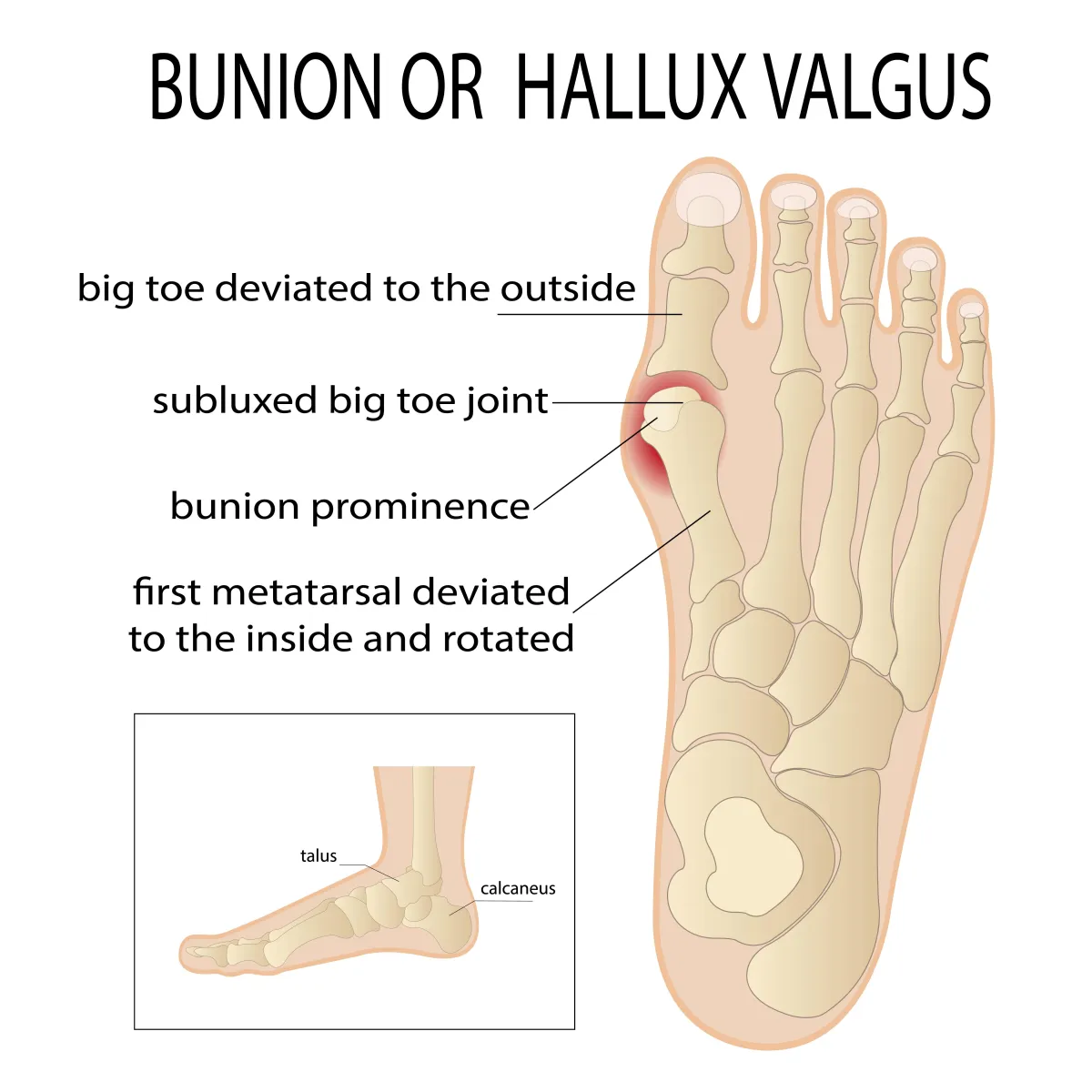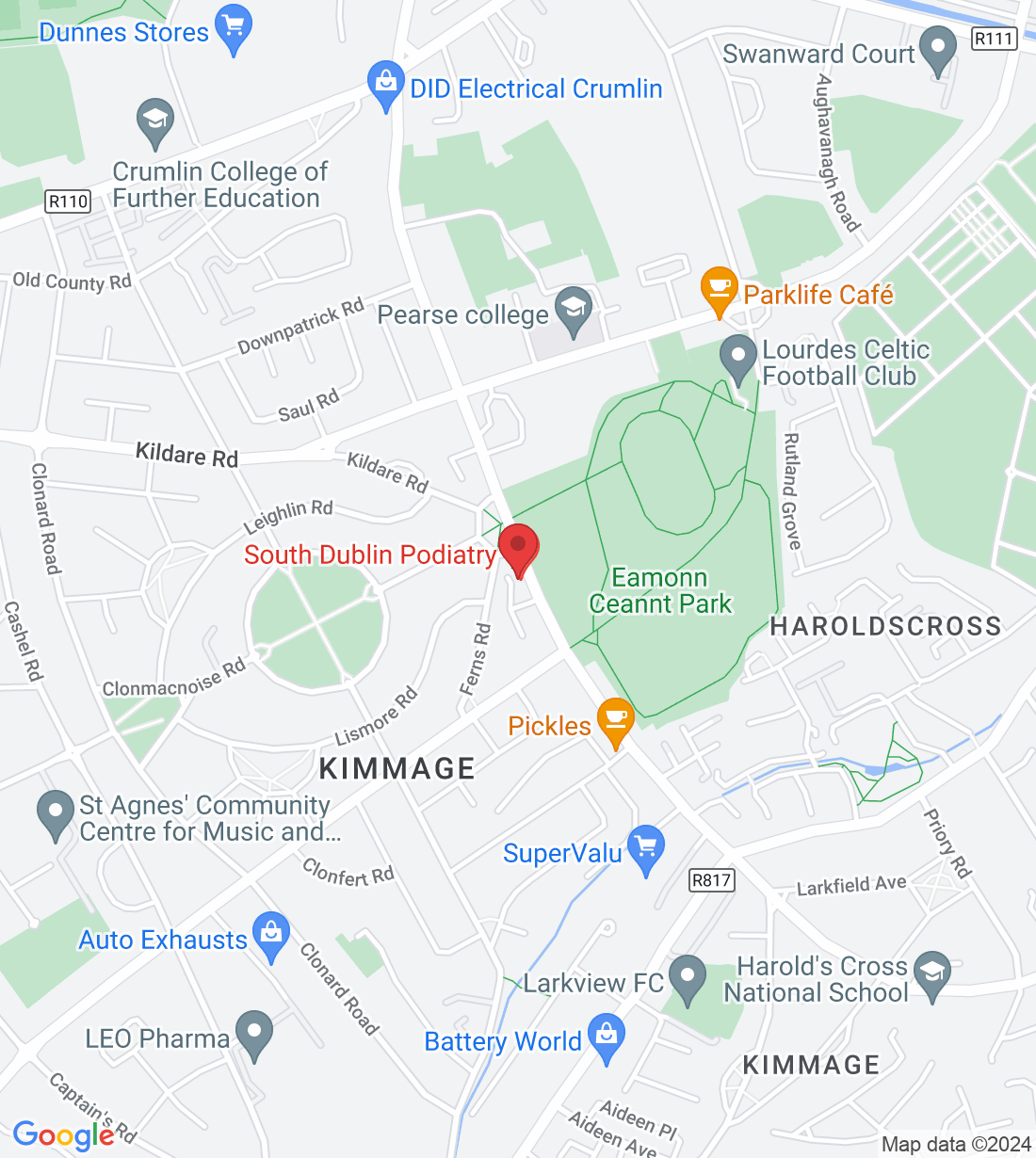Discover How To Avoid Bunion Surgery at South Dublin Podiatry, Kimmage, Dublin 12
Conveniently Located in South Dublin
114 Sundrive Road, Kimmage, Dublin 12, D12 TDX8
Monday - Friday: 8:00am - 6:00pm
Free Parking Available


Download Your FREE Bunion Information Pack:
"6 Secrets on How to Stop Bunion Pain & Slow Their Growth"
👇 Click the button below to get your FREE Report 👇
Do any of these sound familiar?
Your bunion gets bigger each year?
You’re finding it harder and harder to find nice or comfortable shoes?
You're worried that you'll need bunion surgery?
You experience pain in your bunion whenever you walk or run.
Are you concerned that you'll end up with feet like your grandmother?
If you answered YES to any of the above, you're not alone. At South Dublin Podiatry we hear stories like this every single day and we know EXACTLY how to help you

Got a Question?
Ask South Dublin Podiatry and their team of experts
What Are Bunions?

At South Dublin Podiatry, we treat bunions on a weekly basis and understand that it's a common issue that our patients worry about.
We hear from our patients that they don't want to end up with terrible bunions like their grandmother or aunt and be forced to wear ugly shoes or undergo ineffective surgery.
We completely understand these worries, which is why we've created a Free Information Pack with tips you can start using right away to help alleviate your bunion pain.
As foot experts with years of experience, we know that developing a bunion can be a scary experience, and we're here to help.

Is The Bunion Therapy Programme Right for You?
Our Team of Podiatrists at South Dublin Podiatry are experts in Bunion treatment helping 1000's of patients to get back walking and running with relief from Bunion Pain.
How would you like to be able to...
Find out if you are developing a bunion
Become aware of all of your treatment options
Learn the tips to slow down or stop its growth
Develop a plan to stay active with no bunion pain
Master the exercises that mean surgery is much less likely
Wouldn’t it be great to be able to stay active, banish bunion pain, avoid surgery, and never have to wear those "granny shoes"? Let South Dublin Podiatry in Kimmage, Dublin 12 help you take the first step in getting you back to your best again!
Still Confused About How We Can Help Banish Your Bunions? Take Us Up On One Of Our FREE Options
Option #1 (👍 most popular)

Option #2


6 Reasons To Choose South Dublin Podiatry
Highly qualified and experienced podiatrists: South Dublin Podiatry boasts a team of highly qualified and experienced podiatrists who are dedicated to providing top-notch foot and ankle care. Their expertise ensures that patients receive accurate diagnoses and personalised treatment plans tailored to their specific needs.
Comprehensive range of services: Whether it's treating common foot conditions like bunions, ingrown toenails, or plantar fasciitis, or addressing more complex issues such as sports injuries or diabetic foot care, South Dublin Podiatry offers a comprehensive range of services. Patients can trust that all their foot and ankle concerns will be addressed under one roof.
State-of-the-art facilities and technology: South Dublin Podiatry is committed to staying at the forefront of podiatry care by investing in state-of-the-art facilities and the latest technology. This allows for more accurate assessments, advanced treatment options, and enhanced patient outcomes.
Patient-centered approach: At South Dublin Podiatry, patients are the top priority. The team believes in a patient-centered approach, where they listen attentively to the concerns and goals of each individual. This ensures that the treatment plan aligns with the patient's lifestyle and preferences, leading to better compliance and results.
Holistic and preventive care: Beyond just treating existing conditions, South Dublin Podiatry emphasises the importance of holistic and preventive care. They educate patients on proper foot care techniques and lifestyle adjustments to minimise the risk of future foot problems, promoting long-term foot health and overall well-being.
Positive patient reviews and testimonials: The reputation of South Dublin Podiatry speaks for itself through the positive feedback and testimonials from satisfied patients. Many individuals have shared their success stories and experiences, highlighting the clinic's commitment to excellence and patient satisfaction.
Frequently Asked Questions About Bunions and Treatments Available
What is a bunion?
A bunion is a bony bump that forms on the joint at the base of the big toe. It occurs when the big toe pushes against the adjacent toe, causing the joint to stick out and become painful and swollen.
What causes bunions?
Bunions can be caused by a variety of factors, including genetics, wearing tight or ill-fitting shoes, foot injuries, and certain foot conditions such as flat feet or arthritis. It can also be aggravated by activities that put pressure on the toes, such as ballet or sports.
Are bunions hereditary?
Yes, bunions can be hereditary. If you have a family history of bunions, you may have an increased risk of developing them.
Can bunions be treated without surgery?
Yes, non-surgical treatments are available for bunions. These include wearing comfortable shoes with a wide toe box, using bunion pads or cushions to relieve pressure, applying ice to reduce pain and swelling, and taking over-the-counter pain medications. Custom orthotics or shoe inserts can also help in providing support and alleviating symptoms.
When is surgery necessary for bunions?
Surgery is typically considered as a last resort when non-surgical treatments fail to relieve the pain and discomfort caused by bunions. It may be recommended if the bunion is severe, causing significant pain, interfering with daily activities, or leading to other foot problems.
What does bunion surgery involve?
Bunion surgery, also known as a bunionectomy, involves the removal or realignment of the bony bump and the correction of any deformities in the toe joint. The specific procedure will depend on the severity of the bunion and the individual's unique circumstances.
What is the recovery time after bunion surgery?
The recovery time can vary depending on the type of bunion surgery performed and the individual's healing process. Generally, it can take several weeks to months to fully recover. During this time, it's important to follow post-operative instructions, wear proper footwear, and engage in any recommended rehabilitation exercises.
Can bunions come back after surgery?
In some cases, bunions can recur after surgery. However, the risk of recurrence can be minimised by following post-operative instructions, wearing appropriate footwear, and maintaining good foot health habits.
Can bunions be prevented?
While bunions may not be entirely preventable, certain measures can help reduce the risk of their development or slow down their progression. These include wearing comfortable and supportive shoes, avoiding high heels and narrow toe boxes, maintaining a healthy weight, and practicing foot exercises and stretches.
If you have specific concerns about bunions or require professional advice, it's recommended to consult with a podiatrist or orthopedic specialist who can provide a comprehensive evaluation and recommend appropriate treatment options based on your individual needs.
Have Questions? Request a Call Back and Speak With Our Team of Bunion Experts

Fill in the form to request a Call From Our Team
One of our team members will call you for FREE and answer any questions or concerns you may have about your aches and pains.




